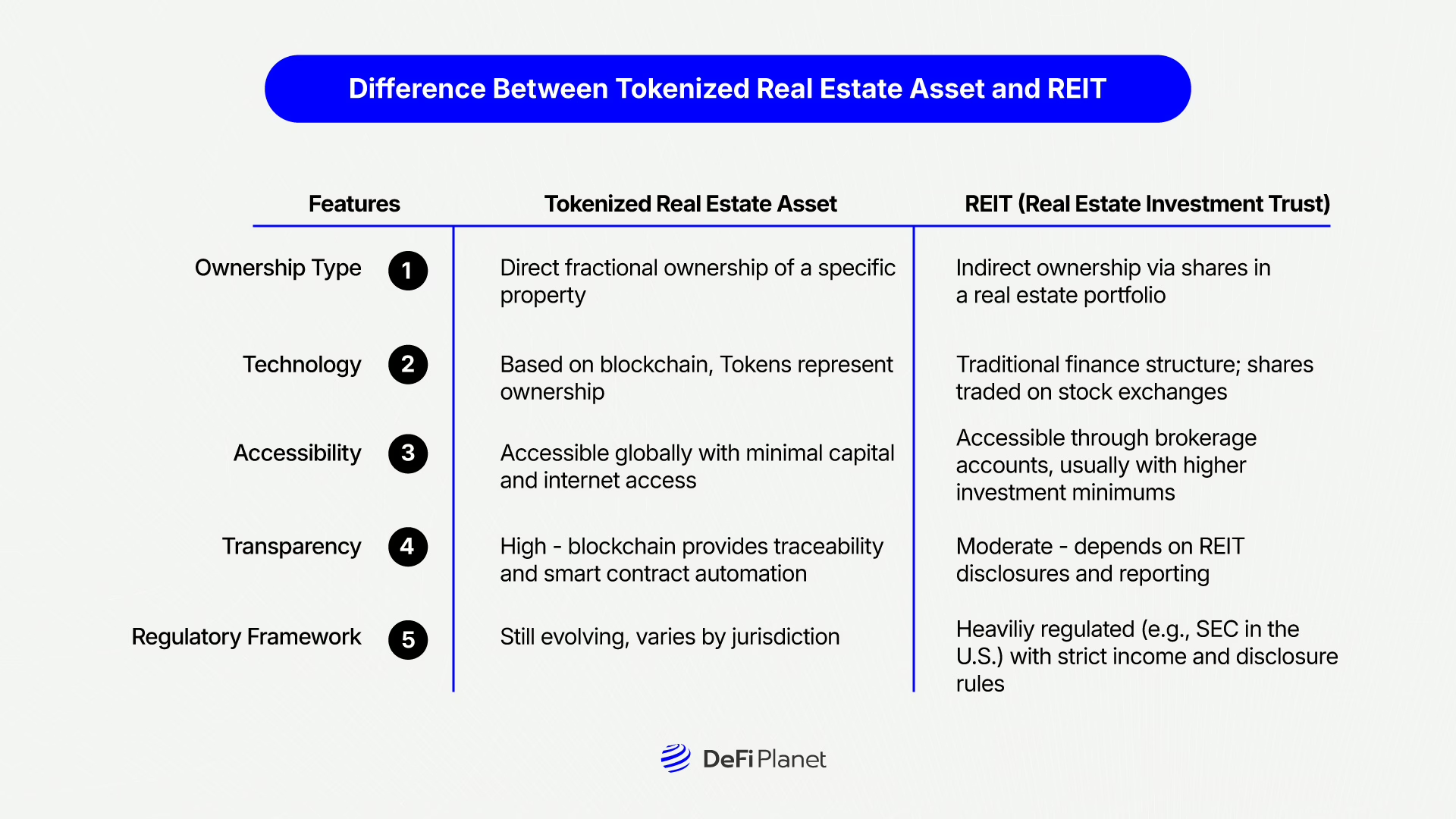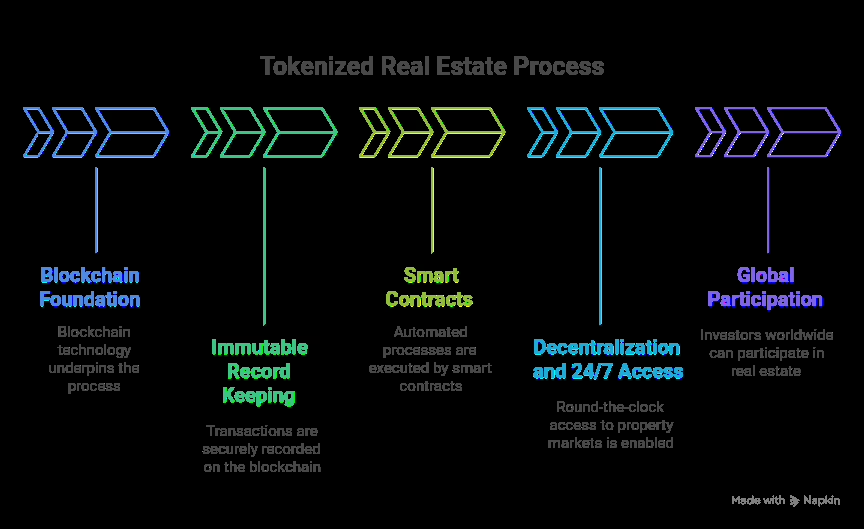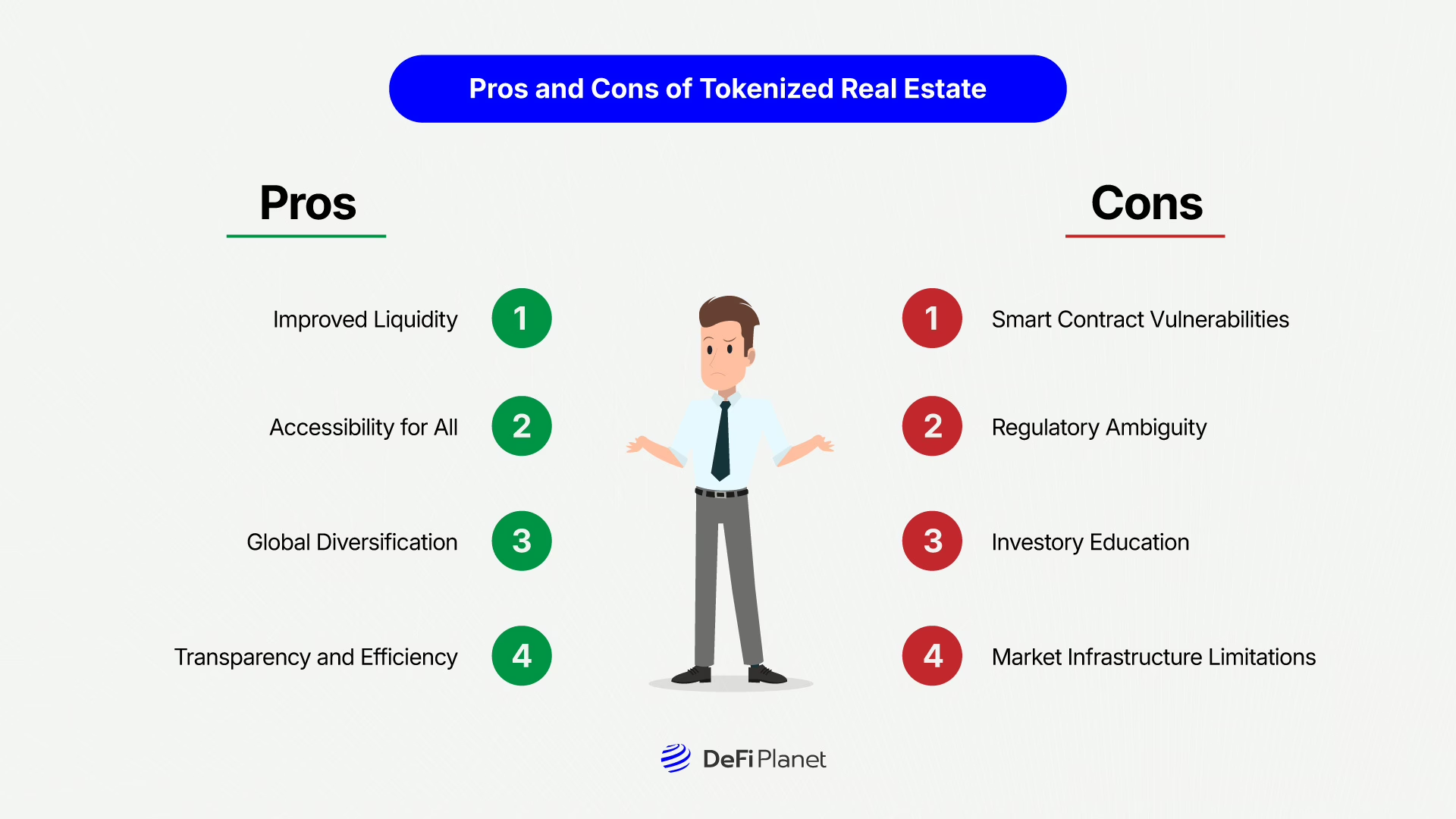The convergence of blockchain expertise and actual property has given rise to a strong innovation: tokenized actual property. This groundbreaking idea is reworking how individuals put money into, personal, and handle actual property, historically one of the crucial unique and illiquid asset courses. With tokenization, the doorways to property funding are opening wider, permitting each institutional and retail traders to take part in actual property markets like by no means earlier than.
This text explains what it means to tokenize actual property, the way it works, the advantages it provides, authorized and regulatory implications, related dangers, and what the longer term might maintain.
What’s Actual Property Tokenization and How Does it Differ From Actual Property Funding Belief (REIT)
Actual property tokenization refers back to the strategy of changing possession rights in a bodily property into digital tokens on a blockchain. Every token represents a fractional share of the asset, granting the holder partial possession or rights tied to the property. These tokens will be purchased, bought, or traded on blockchain platforms just like how shares or cryptocurrencies are exchanged, providing traders extra flexibility and entry.
Conventional actual property funding usually requires massive upfront capital, includes advanced authorized procedures, and lacks liquidity. Tokenization simplifies and democratizes entry by permitting properties, whether or not residential, business, or industrial, to be divided into hundreds of tokens. With as little as the price of a single token, traders can acquire publicity to high-value actual property markets that have been as soon as restricted to institutional gamers or rich people.
For instance, contemplate a $5 million residence advanced in New York Metropolis. Via tokenization, this asset may very well be divided into 500,000 tokens, every price $10. This implies somebody with simply $100 can personal a fractional curiosity in a premium actual property asset, obtain a share of rental revenue, and profit from potential property appreciation.
In distinction, a Actual Property Funding Belief (REIT) works otherwise. REITs are corporations that personal, function, or finance income-generating properties. If you put money into a REIT, you’re shopping for shares within the firm—not the person properties. Traders earn returns within the type of dividends, as REITs are legally required to distribute not less than 90% of their taxable revenue. Nevertheless, you should not have direct possession of the true property property, nor are you able to affect their administration or operations.
As an illustration, when you make investments $1,000 in a publicly listed REIT, your cash goes right into a diversified portfolio of properties comparable to workplace buildings, purchasing malls, or hospitals managed by professionals. You obtain common dividend payouts, however your funding is tied to the general efficiency of the REIT’s portfolio and the inventory market, not a particular property.
READ ALSO: High 10 High Use Circumstances of Asset Tokenization
So, what’s the distinction between tokenized actual property and REITs?
The primary distinction lies in possession and management: tokenized actual property provides direct fractional possession of particular person property with extra transparency and probably greater liquidity, whereas REITs present oblique publicity to professionally managed actual property with constant dividend revenue however much less flexibility and private management.
As blockchain adoption grows, tokenized actual property is positioning itself as a transformative pressure within the funding world, bridging conventional property markets with decentralized finance and providing a brand new stage of accessibility, effectivity, and transparency for traders globally.

How Does Tokenized Actual Property Work?

Blockchain Basis
Blockchain is the technological spine that makes tokenization attainable. However how does tokenized actual property work on the blockchain? In observe, right here’s how blockchain allows safe, clear, and decentralized fractional possession:
Immutable Report Protecting
Each transaction, whether or not it’s a token buy, sale, or switch, is recorded on the blockchain ledger. This supplies an immutable, tamper-proof file of possession and transaction historical past, eliminating the necessity for conventional, guide documentation.
Good Contracts
These are self-executing items of code embedded on the blockchain. Good contracts automate processes like dividend funds, rental revenue distribution, or possession transfers when predefined situations are met while not having middlemen.
Decentralization and 24/7 Entry
In contrast to conventional actual property markets that function throughout enterprise hours and infrequently by way of intermediaries, blockchain permits round the clock entry to property markets by way of decentralized platforms. No banks, brokers, or notaries are required for token trades.
International Participation
Blockchain allows world attain. An individual in Singapore can put money into an actual property venture in Canada with out bodily being there or coping with native paperwork, offered regulatory tips are adopted.
What Are the Advantages of Tokenized Actual Property?
Tokenization introduces a number of benefits that rework the normal actual property mannequin:
Improved Liquidity
Conventional actual property transactions can take weeks or months to shut. Tokenization introduces secondary markets the place tokens will be rapidly traded, permitting traders to exit positions with out promoting the whole property. This liquid marketplace for an in any other case illiquid asset class is a game-changer.
Accessibility for All
Actual property has lengthy been reserved for high-net-worth people and establishments. Tokenization lowers the barrier to entry, enabling retail traders and smaller gamers to achieve publicity to the market with minimal capital.
International Diversification
With tokenized actual property, traders can construct geographically various portfolios with ease. A single investor might maintain tokens representing properties in Paris, São Paulo, and Cape City—all from a cellular app.
Transparency and Effectivity
All transactions are clear, auditable, and traceable on the blockchain. Traders can confirm possession data, rental revenue, bills, and asset historical past in real-time. Good contracts additionally take away paperwork and intermediaries, streamlining the whole funding lifecycle.
Automated Compliance and Dividends
Good contracts can implement regulatory necessities and robotically distribute rental revenue or dividends proportionally to token holders, guaranteeing quicker and extra correct payouts.
RELATED: Is Actual World Asset Tokenization Positioning DeFi to Outpace TradFi?
Dangers and Challenges in Tokenized Actual Property Investments
As with all rising expertise, tokenized actual property presents vital challenges and dangers:
Good Contract Vulnerabilities
Good contracts are solely as dependable because the code behind them. Bugs, design flaws, or malicious actors can lead to lack of funds, and as soon as property are stolen or misrouted, restoration is usually not possible.
Regulatory Ambiguity
The dearth of clear authorized frameworks in lots of jurisdictions might expose traders and issuers to unexpected authorized motion, halted tasks, or delisted tokens if regulators intervene.
Investor Training
Tokenized property will be complicated for conventional actual property traders unfamiliar with blockchain. With out correct training and transparency, the danger of confusion funding phrases is excessive.
Market Infrastructure Limitations
Regardless of progress, secondary markets for actual property tokens are nonetheless underdeveloped. Low liquidity, restricted purchaser curiosity, and lack of interoperability between platforms stay challenges.
Professionals and Cons of Tokenized Actual Property

READ ALSO: Is Tokenization All That It’s Cracked Up To Be?
Authorized and Regulatory Concerns
Whereas tokenized actual property holds promise, navigating its authorized panorama remains to be a piece in progress.
Securities Classification
In lots of jurisdictions, tokenized actual property choices are thought of securities and should adjust to related securities legal guidelines. This usually means adhering to KYC (Know Your Buyer), AML (Anti-Cash Laundering), and investor accreditation necessities
Licensing and Compliance
Launching a tokenized providing sometimes requires a regulated platform or broker-dealer license, and will must cross by way of a Safety Token Providing (STO) course of just like a public IPO however for tokenized property.
Jurisdictional Fragmentation
Actual property legal guidelines differ considerably throughout international locations, and even between states or provinces inside a rustic. Authorized enforceability of sensible contracts, recognition of digital possession, and tax implications have to be assessed on a case-by-case foundation.
Taxation Uncertainty
Token holders could also be topic to property taxes, capital beneficial properties taxes, or revenue taxes, relying on how income from the property is structured. Sadly, world tax steerage for tokenized property stays inconsistent, and in lots of areas, undefined.
Is Tokenization the Way forward for Actual Property?
Indicators level to sure. Regardless of the present hurdles, the momentum behind tokenized actual property is steadily gaining floor, signalling a possible paradigm shift in how world property markets function over the subsequent decade. This transformation is being fueled by a convergence of technological innovation, institutional curiosity, and evolving regulatory frameworks.
Institutional gamers, together with personal fairness companies and actual property builders, are more and more exploring tokenization as a method to unlock new capital streams and streamline operational inefficiencies. By digitizing possession and transactions on the blockchain, these entities are in a position to attain a broader investor base whereas decreasing prices related to conventional actual property processes.
RELATED: The Position of Actual World Property (RWAs) within the Subsequent DeFi Increase
On the similar time, compliant platforms are on the rise. Blockchain startups are working carefully with authorized and regulatory our bodies to make sure that their programs meet the requirements required for id verification, tax reporting, and monetary disclosure. This collaborative strategy is fostering belief and paving the way in which for mainstream adoption.
Tokenized actual property can be half of a bigger pattern generally known as the Actual-World Asset (RWA) increase. Past property, this motion encompasses tokenized variations of artwork, commodities, and infrastructure with the RWA market. As this pattern accelerates, actual property is poised to be certainly one of its most vital beneficiaries.
In essence, tokenized actual property is ushering in a brand new period of accessibility, liquidity, and effectivity for world property funding. By leveraging blockchain expertise, it challenges the normal obstacles of excessive capital necessities, gradual transactions, and restricted market entry. Nevertheless, as with all rising innovation, navigating the authorized, technical, and monetary complexities is essential.
For these ready to have interaction with this evolving panorama, the way forward for actual property lies not simply in bricks and mortar however in blocks and tokens.
Disclaimer: This text is meant solely for informational functions and shouldn’t be thought of buying and selling or funding recommendation. Nothing herein needs to be construed as monetary, authorized, or tax recommendation. Buying and selling or investing in cryptocurrencies carries a substantial danger of economic loss. All the time conduct due diligence.
If you wish to learn extra market analyses like this one, go to DeFi Planet and comply with us on Twitter, LinkedIn, Fb, Instagram, and CoinMarketCap Neighborhood.
Take management of your crypto portfolio with MARKETS PRO, DeFi Planet’s suite of analytics instruments.”
The publish Actual Property on the Blockchain: Is Tokenization the Future? appeared first on DeFi Planet.


